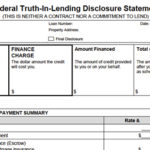Pre-qualification vs. pre-approval.
These are two terms that get thrown around far too much. There is a great difference between the two, and it’s time we explain the difference and what they mean to you as a borrower.
 If someone tells you that you’re pre-qualified, it SHOULD mean that you’ve given them a full application including your social security number, employment information, assets, etc. This is enough to perform a basic credit application. A pre-qualification is that it is the bare bones approval. Without proof of the information that is discussed, your application is simply based on what is said. Whether we like to realize it or not, when providing a credit application we tend to be less than right-on with numbers or sometimes forget about small details that might effect a loan approval. Usually a pre-qualification is verbal and documentation is asked for to move to the next step.
If someone tells you that you’re pre-qualified, it SHOULD mean that you’ve given them a full application including your social security number, employment information, assets, etc. This is enough to perform a basic credit application. A pre-qualification is that it is the bare bones approval. Without proof of the information that is discussed, your application is simply based on what is said. Whether we like to realize it or not, when providing a credit application we tend to be less than right-on with numbers or sometimes forget about small details that might effect a loan approval. Usually a pre-qualification is verbal and documentation is asked for to move to the next step.
If someone tells you that you’re pre-approved, it SHOULD mean that you’ve provided the documentation to support everything you mentioned in your application. This gives the loan originator an opportunity to re-calculate income, assets, etc. Once the numbers on the application are accurate with the documentation provided, a true assessment of the loan can take place. If you’re eligible for a loan, you should then be issued a pre-approval letter at that time.
A recent experience pushed me to write on this subject. Recently a client of mine was given a pre-approval letter (by another lender) without verifying any income, assets, etc. If If you were a seller, would you want an offer coming in from someone like this? I know I wouldn’t. There are many disadvantages to not documenting information on the application.
- You may not actually qualify for the loan you’ve been told you qualify for.
- Your interest rate could be much higher than what you’ve been quoted.
- You may loose earnest money on an offer if your financing falls through.
- You will waste your time looking at homes you may not qualify for.
- It’s pretty safe to say your loan officer isn’t a professional.
The truth is, I cannot regulate this topic by myself. However, It is my goal to raise the bar on this particular subject and get lenders back to doing what they are supposed to do and not write pre-approval letters with a blind fold on. It’s more important now than it has been in an extremely long time to be thorough with applications and make sure there are no small issues that may get caught up in underwriting.
It’s unfortunate, but the phrase “A pre-approval letter is only worth as much as the paper that it is written on.” is used too much and it’s situations like this that remind me why realtors say it. I’m going to step off my soap box for now.. but seriously – make absolutely sure that you’re working with a professional. There are plenty of us still out there ; )









